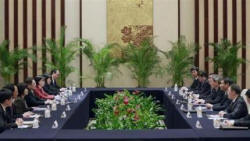|
 China,
Taiwan agree to open offices after historic talks China,
Taiwan agree to open offices after historic talks
 Send a link to a friend
Send a link to a friend
[February 11, 2014]
BEIJING (Reuters) — China and
Taiwan, at odds for more than six decades, agreed at historic talks on
Tuesday to set up representative offices as soon as possible, though
sensitive political issues like a formal peace treaty were not up for
discussion.
|
|
 The talks between Taiwan's Mainland Affairs Minister Wang Yu-chi
and China's Vice Foreign Minister Zhang Zhijun, who heads the Taiwan
Affairs Office, were the first since the 1949 creation of the
People's Republic of China. The talks between Taiwan's Mainland Affairs Minister Wang Yu-chi
and China's Vice Foreign Minister Zhang Zhijun, who heads the Taiwan
Affairs Office, were the first since the 1949 creation of the
People's Republic of China.
They mark a big step towards expanding cross-strait dialogue beyond
economic and trade issues.
China's ruling Communist Party considers Taiwan a renegade province
and has never ruled out the use of force to bring the island under
its wing after taking control of the mainland at the end of a civil
war. But economic ties have grown considerably in recent years.
Taiwan's Wang described his meeting with Zhang, in the eastern
Chinese city of Nanjing, as "an unimaginable occasion in earlier
years", China's official Xinhua news agency reported.
"Being able to sit down and talk is a really valuable opportunity,
considering that the two sides were once almost at war," Wang said.

The mainland's Zhang told Wang that both sides should have "a little
more imagination" regarding relations.
"We meet under great attention and expectations and bear great
responsibilities," Zhang said.
Xinhua later reported that the two sides agreed to set up
representative offices "as soon as possible" for the two
semi-official organizations which deal with ties between the two.
Taiwan and China also agreed to deepen economic ties and
"appropriately deal with" issues on medical care for students in
either place.
In October, Chinese President Xi Jinping said a political solution
to the standoff between the mainland and the island could not be
postponed forever.
[to top of second column] |

But Taiwan President Ma Ying-jeou later said he saw no urgency to
hold political talks and he wanted to focus on trade.
Nanjing was China's capital during the rule of the Nationalists,
until they fled to Taiwan in 1949 upon losing the civil war with the
communists. The city is also the burial place of Sun Yat-Sen, the
founder of modern China, revered by both mainland China and many in
Taiwan.
Since taking office in 2008, Taiwan's Ma has signed a series of
landmark trade and economic agreements with China, cementing China's
position as Taiwan's largest trading partner.
But booming trade has not brought progress on political
reconciliation or reduced military readiness on both sides. Many in
democratic Taiwan fear China's designs for their free-wheeling
island.
Despite the close economic ties, U.S.-armed and backed Taiwan
remains a potential flashpoint and its recovery is a priority for
China's Communist Party, which is investing billions to modernize
its military.
(Reporting by Ben Blanchard; editing by Robert Birsel and Ron
Popeski)
[© 2014 Thomson Reuters. All rights
reserved.] Copyright 2014 Reuters. All rights reserved. This material may not be published,
broadcast, rewritten or redistributed.
 |